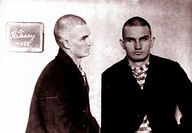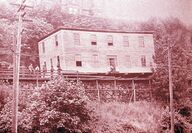Sorted by date Results 101 - 125 of 422

Most of us have noticed fishing flies for sale somewhere here along the river. They are casually bought and sold in tackle shops, hardware stores, gas stations, restaurants, and taverns from Springfield to Sisters - thousands of them every year. Hundreds more are made and fished by individuals, who add to the pleasure and satisfaction of their sport fishing with flies of their own manufacture. Though the numbers increase yearly, the demand for professionally tied flies increases at an even...

Feb. 17, 1995 Police Find Hendricks Bridge Jumper Man Wanted In High-Speed Chase Swam Away In Icy River Walterville: A Friday morning police pursuit through Springfield and the lower McKenzie Valley ended when the suspect jumped off Hendricks Bridge and escaped. According to Lane County Sheriff's Office reports, the incident began close to 1 a.m. on February 10, with a traffic stop initiated by a Springfield Police Dept. officer. The patrolman had pulled a 1983 Mazda RX7 over in the 4500 block...

On the morning of Dec. 7, 1904, Stephen A.D. Puter had just arrived at the office of U.S. Marshal Jack Matthews. He was expecting some friends to come by … and bail him out of jail. Puter had just been convicted of masterminding a plan to swindle the U.S. government out of thousands of acres of prime timberlands. He had not yet been sentenced. Like all convicts, he had the option of either staying in jail until sentencing or posting bail. In his case, bail was set at $4,000. He figured his frien...

We've probably all seen the old "Traveling The Old McKenzie Highway" photo that shows a touring car rounding the bend of the narrow, graveled road that used to run up the valley, A closer look at that photo, however, unlocks some of the early history of the area and gives some insights into the business of fish hatcheries and the raising of fish stocks that now play such a big role in our local economy. One man who can take a look at that picture and talk for hours about it is Art Minney...

As you will have gathered, it didn't exactly take brilliant detective work to figure out what was going on over at Dunbar Produce and Grocery. By November of 1893, word of what they were up to had been filtering up from the waterfront for at least a year and a half. So, in late November 1893, a grand jury returned indictments against 15 people - including Blum, Dunbar, and Lotan. The charges involved smuggling more than two tons of opium and running a human-trafficking operation smuggling...

It's not clear when William Dunbar and Nat Blum, owners of the Merchant Steamship Co. in Portland, started smuggling opium on their steamships, the Wilmington and the Haytian Republic. They may have been smuggling opium all along; but the astonishing rate at which opium-related disasters started piling up after mid-1892 following at least 18 months of smooth operations suggests that before that, they were only smuggling people. Smuggling opium was not only much more lucrative than smuggling...

NOTE: In last month's Offbeat Oregon column, we explored the unlikely origins and career of Yosuke Matsuoka, the foreign minister of Imperial Japan who was responsible for Japan's military alliance with Nazi Germany. Matsuoka, you'll remember, spent most of his teenage years in Portland as a sort of adopted son of a prominent merchant and smuggler named William Dunbar. In this month's article, we're going to go into detail on the story of the smuggling ring that William Dunbar operated with his...

Reprinted from McKenzie River Reflections August 27, 1982, edition About 1925 a steel bridge was built about 100 yards below the old ferry crossing. When it was finished and the old covered bridge was to be removed, the school was dismissed at Walterville. The teacher and students all walked down to the river and stood on the new bridge and watched while the county road crews dynamited the covered bridge to smithereens. The covered bridge at "The Narrows" had to be removed the same way. In 1963...

So much of the time we go busily about our everyday life with no thought of how our area got to be the way it is now. I find that most people really take interest in and enjoy the area much more once they learn something about the history behind it. As we go gliding up the McKenzie Highway, how many of us ever give any thought to what this route was like or what traveling it was like, say 100 years ago! I'll not dwell on the road-highway at this time but would like to rap some about the various...

When Yosuke Matsuoka accepted his appointment as Imperial Japan's foreign minister, it was the fulfillment of a dream for him. The gregarious 13-year-old boy who had been informally adopted into Portland opium smuggler William Dunbar's household back in 1893 had come a long way in the following 47 years. He had become a national hero in Japan, and was by far the single most famous Japanese person in the world internationally and almost certainly the most famous University of Oregon alumnus. It...

Yosuke Matsuoka left his Oregon home for the last time in 1902 when he was 22 years old; he'd lived in Oregon and, briefly, California, since age 13. His Oregon years had been happy ones, and he would remember them fondly for the rest of his life. Oregon would remember him fondly, too (until Pearl Harbor Day, of course). Within 25 years of his graduation, he would be probably the most famous University of Oregon alumnus in the world; within 50, it's most notorious. That, of course, was all far i...

Part 1 - The opium smuggler's foster son It may be true that the movement of a butterfly's wings on one side of the world can seed a tornado on the other. But whether that's literally true or not, it certainly is figuratively true, and nowhere is it better demonstrated than in the case of 1890s businessman and opium smuggler William Dunbar of Portland, Oregon. If we could take Dunbar out of the stream of history before about 1890, we would derail events that led directly to Imperial Japan's...

Opening up the Santiam Pass By M.J. Nye In the fall of 1880, a Company was organized to build a wagon road over the Cascade Mountains via what is now known as the Santiam Pass. Little or nothing was known about the country at the headwaters of the south Santiam, along which the road was later built; for it is supposed that no white man had ever crossed the Cascade Mountains at this point until 1859 when Andrew Wiley led a company of men across. Wiley had previously led a band of emigrants from...

Continued From Last Week Part 4 From the January 19, 2012 edition of McKenzie River Reflections January 18th, 1812 On January 18th two hundred years ago Donald MacKenzie finally reached the Pacific Ocean. At 27 years old and 6' 6" in height, he was already well-regarded as the assistant leader of the 60-person "Astorian Overland Party". The McKenzie River was later named after this young leader. This is the final Chapter of Travels with Mackenzie. In late November 1811, the Overland Expedition f...

From the September 8, 2011 edition of McKenzie River Reflections Two hundred years ago this month Donald MacKenzie, age 28, was making his way from the Missouri River towards Fort Astoria, as assistant leader of the "Astorians Overland Party" made up of fifty-six men, a woman, and two children. Ten years later a map would be drawn by the Hudson Bay Company, naming a branch of the Willamette River as "Mackenzie's Branch" after Donald Mackenzie. Understanding why his name was given to this river...

The "Golden Age of Outlaws" had a good run - almost 40 years. It kicked off just after the Civil War when thousands of battle-hardened Confederate veterans with nothing to lose spread out across the Western frontier; and it ended in a field in eastern Washington on Aug. 5, 1902. That was the date when the last Golden Age outlaw, Harry Tracy, went out in a blaze of gunfire following the bloodiest prison break in Oregon history, followed by a two-month-long, even bloodier manhunt. Harry Tracy was...

State denies Hwy. 126 speed zone request VIDA: A request to drop the speed limit on Hwy. 126 between Indian Creek And Mountain View Lane wasn't supported by a recent traffic study by the Oregon Dept. of Transportation. The report to Lane County from Edward Fischer, ODOT's State Traffic Engineer in Salem, found a high percentage of the vehicles traveling through the area were traveling faster than the posted 55 mph speed limit. The county had requested the speed be dropped to 45 mph, in...

From the February 14, 2008 edition of McKenzie River Reflections MCKENZIE RIVER: A San Francisco-based company has filed an application with the Federal Energy Regulatory Commission for a preliminary permit to develop up to nine new hydropower projects on the McKenzie River. Principle Power Hydro said the plants would be constructed between river mile 75 at Scott Creek (just upstream of Paradise Campground) and just above Leaburg Dam at river mile 41. Each could be similar in size to the Eugene...

To the average Oregon City resident, there wasn't much to celebrate in the vacant, dilapidated old house by the foot of Willamette Falls. The house had, until a few years before, been known as the Phoenix Hotel, and it had been a very flagrant bordello. Conveniently located right in the heart of what was then Oregon City's industrial core, it had been a handy place for workers in the woolen mills, paper manufacturies, sawmills, and other operations that took advantage of the plentiful water...

In this third and final part of a 3-part series on iconic Hollywood films shot in Oregon, we'll talk about six films rather than five. Our survey ends, rather arbitrarily, with the end of the 1980s, at the dawning of the Gus Van Sant era of filmmaking in Oregon (and particularly in the Portland area). But first: 11. The Apple Dumpling Gang (1975) Walt Disney Productions. Starring Bill Bixby, Susan Clark, Don Knotts, and Tim Conway. Oregon connection: Deschutes County. This lightweight, feel-good...

This is part 2 of a 3-part series on iconic Hollywood movies shot in Oregon. Last week, we looked at the era from the dawn of filmmaking through the 1950s. Today, we'll talk about movies made between 1960 and 1975. Of course, this is not an article about popular cinema as a mirror of popular culture. But it's hard to miss the social changes these pictures showcase. The nation that produced Shenandoah, with its faint stirrings of uneasy anti-war sentiment still wrapped up in classic...

In the past 25 years or so, Oregon has come into its own as a place to make movies. The iconic projects have come thick and fast, especially in the last 25 years or so. The last 15 years of the century saw The Goonies, Stand By Me, Drugstore Cowboy, Point Break, Free Willy (twice), Mr. Holland's Opus, The Postman, Ricochet River, and Men of Honor filmed here - along with dozens of others. And the 21st century so far has brought us Pay It Forward, Elephant, The Ring (twice), Fahrenheit 9/11,...

In the first month of 1852, everyone in the frontier community of Cynthian was talking about the big crime wave. Well, it was big by frontier Oregon standards. Although it was (and still is) the seat of Polk County, Cynthian - which was renamed Dallas later that same year - was a tiny place, with no more than a few hundred residents. But, it seemed, one of those few hundred people was a burglar and had hit three different homes over the previous few months. Folks around Cynthian had a suspect...

Crime, they say, does not pay. Yet it's pretty easy to look back through history and find examples of a certain kind of criminal for whom it did, handsomely, and for decades. With charisma, moxie and a seemingly endless supply of good luck, these characters sometimes even manage to cheat karma and die a natural death. And somehow, after these criminals are gone, people remember them with a kind of fascinated fondness, and say things like, "well, we'll never see another like that again." The...

George L. Baker, the big, bluff, hail-fellow-well-met owner of Portland's Baker Theater, was flabbergasted. As he and his fellow Portland Rosarians were getting ready to march in the 1917 Rose Festival parade, a courier had run up to him with a cryptic message: "The grand marshal's car awaits," the messenger puffed. "Hurry and get in and don't delay the parade." "Why, I'm not grand marshal," Baker replied, puzzled. Just then his friend Gus Moser, who was in charge of the parade that year, hustle...